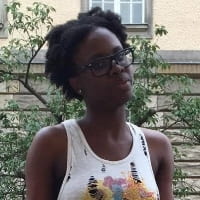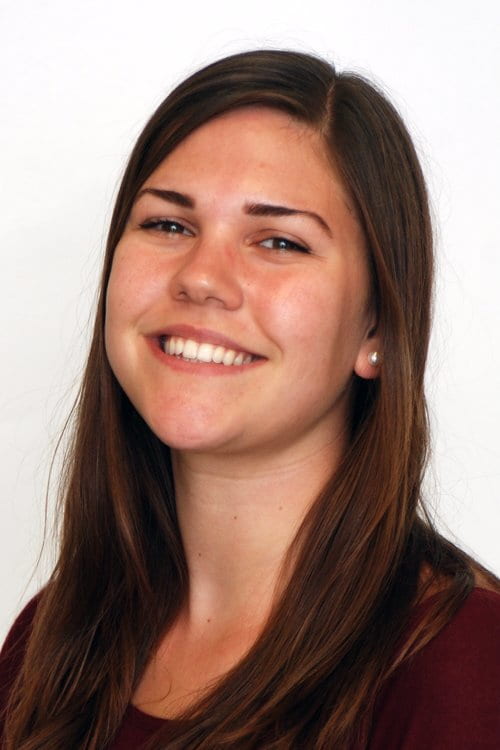Sophia KiNG (CHEMISTRY AND BIOCHEMISTRY)
February 2021

1. Can you briefly summarize the educational path that led you to UCLA?
I completed my primary and secondary education in my home country, Guyana. I then applied to schools in the US. Adelphi University has a 3-2 engineering program with Columbia University, so the thought of getting a B.S. in Chemistry from Adelphi in 3 years then a M.S. in Chemical Engineering from Columbia was appealing. However, after conducting chemistry research at Adelphi University during my undergraduate studies and abroad, I realized that I was more interested in pursuing a PhD in chemistry rather than a chemical engineering degree. This led me to apply to graduate schools and now I’m here at UCLA.
2. What was your source of inspiration to pursue a STEM education and specialize in Chemistry?
I was really curious as a child and loved to learn. I found that science helped answer many of my questions on how things worked. I really liked mixing things together to see what the result would be: simple things like paint, different lotions to make salves, hair pomades, etc. In my formal education, I really liked my math and science classes. I really found chemistry lessons and experiments to be most interesting, so I stuck with it.
3. What were the main obstacle(s) you had to overcome to pursue your education?
Most of my hurdles in undergrad were financial. My family is not rich, but they did everything they could to allow me to study so far away from home. After high school, I deferred my admission for a year because I couldn’t afford the upfront cost for my visa. Getting a scholarship as an international student is pretty tough and many of the scholarships from the government of my country are earmarked for very specific fields or countries. My mom tried her hardest and found the money to get me here. A few loans later, I was able to complete my undergraduate degree. The financial burden in graduate school is not as immense since your tuition and fees are covered and you receive a stipend. However, Non-Resident Tuition (NRT) isn’t always waived for international students, which is a financial burden. The constant reminder of the cost of getting to where I am has kept me pretty focused on succeeding in whatever I do.
4. How did you become interested in sustainability?
Guyana is a developing country, made up of about 80% virgin rainforest, so growing up I’ve always heard that we need to protect the forest, the earth, and live sustainably. At the same time, I always believed that preserving lands and developing as a nation were mutually exclusive ideals since it seemed like people in developed countries lived lavishly and didn’t care as much as we did about preserving and saving the earth. However, these same developed countries are always a part of climate and environmental agreements. This paradox suggested that their leaders do care and that developing in a sustainable manner may be possible for poorer countries.
5. Can you describe your experience with the outreach activities at CNSI?
I volunteer with CNSI education in their general outreach events and their workshops for K-12 teachers and, during the summer, high school students. In the general outreach events, we have demonstration booths of different experiments to explain nanoscience concepts to people from all walks of life. In the workshops, we help teachers learn the new nanoscience-based experiments that they can implement in their classrooms. I enjoy being a part of these various outreach activities and spreading my enthusiasm for science. My favorite is the teacher workshop, which is always accompanied by a kit of all the necessary supplies that the teachers need for their students. I love hands-on research and would have definitely appreciated doing experiments like these when I was younger.
6. What aspects/topics of INFEWS have you enjoyed most, and has INFEWS changed your thinking regarding sustainability?
I get to interact with like-minded graduate students with whom I would have never interacted otherwise. It is also interesting to learn other’s perspectives about sustainable approaches that aren’t hinged on conservation. I found geoengineering (engineering the atmosphere to help cool the earth) and the ethics of implementing similar concepts interesting. It is very close to science fiction, but also very possible given how dire the climate crisis is. Environmental justice is another topic I enjoyed learning about. It shows that there is a growing number of people that are fighting for people who are often not part of larger decision-making processes – the poor, underrepresented minorities, etc. This makes me a bit less pessimistic about the future.
7. How has your participation in INFEWS contributed to your academic and/or professional development?
Many sessions in the brown bag seminar were focused on professional development. I appreciated this since I tend to be very focused on doing research. The numerous career development workshops helped frame the skills I gained as a researcher into something marketable. The other classes were good for developing my communication skills and being aware of the opportunities in sustainability and for networking.
8. What has been your experience as a Black graduate student in a STEM field?
I identify first as an international student, then as a Black student, which sometimes makes me feel like an imposter, or disingenuous. I understand and empathize with the experiences of BIPOC in America and add my voice to their calls for inclusion and diversity, because I understand the feelings of being out-of-place and know those calls are to benefit all people, including myself. However, my experience of racism is not the same. Where I’m from while there isn’t a deep systemic problem, there is discrimination and prejudice between the difference races that bubbles beneath the surface of daily life and rears their ugly head every five years or so (every elections year, since race and politics are deeply intertwined, and the main political parties are made up and appeal to different races). While racism in Guyana is a big problem that the population is trying to wish away by pretending it does not exist, the roots of the problems are not as deep, in my opinion. There is no redlining, no disproportionate funding of public schools based on the district you live in, etc. As such, overall, the hurdles I needed to face to succeed and occupy the space I currently do were not as high as they were to many BIPOC whose stories I have learnt through reading, listening to stories from friends, podcasts and slam poetry. They were mostly financial, as stated prior, or based on staying on top of news of the changing immigration policy, or news from a country most people have not heard about and therefore do not care about.
With my long disclaimer out of the way, being a STEM graduate student is difficult — the deadlines are constant, the experiments do not always work as you envisioned it. These issues are all sadly a part of the process. I am fortunate to have had supportive research advisors, both at present and at my undergraduate institution, which makes my experience mostly positive. As a Black, female graduate student, while most of my experiences in the STEM field have been positive, I do find myself actively avoiding real or perceived negative interactions to protect my mental wellbeing, be it covert racism, which I’ll admit that I sometimes have a problem detecting being from a place where thinly veiled racism, or sexism, is the norm. However, trying to avoid negative interaction is exhausting and sometimes affects the way I work. Specifically, while I am aware that mistakes are a part of the learning process and I believe I am pretty good at troubleshooting and fixing said mistakes, I do find myself always needing to be perfect, since any mistake I make seems to be magnified and used to confirm people’s negative biases. So, I tend to react badly to criticism, not by lashing out, but by being especially hard on myself by not failing to live up to the ideals of others. I’ve been working on being kinder to myself by taking breaks and constantly reminding myself that mistakes happen, and that I am enough.
9. What advice would you give to aspiring scientists who will be applying to colleges in the coming years?
Try it. Science is not easy, but nothing really is. There are pros and cons to every choice that you make, so if your passion for science outweighs the cons, I believe you can make it. Success will probably not be as you envisioned it, so celebrate the small victories and use them as inspiration during the most difficult times. Don’t be afraid of changing if you find that you do not enjoy something that you were sure you were going to. Lastly, even when you love what you do, it is ok to take breaks.
Priera Panescu (Chemistry and Biochemistry)
February 2019

1. What aspects/topics of INFEWS have you enjoyed most, and has INFEWS changed your thinking regarding sustainability?
I’ve especially enjoyed the field trip class! The class is so unique because trainees get to physically go to locations around Los Angeles where science and technology is being actively used and developed to create more sustainable practices around LA. In particular, the tour of UCLA and the Los Angeles Cleantech Incubator really showcased some innovative ways Los Angeles is improving food, energy, and water sustainability.
The program has really opened my eyes to how much policy and regulations control how quickly (or slowly) sustainability goals are reached. It is frustrating how much bureaucracy is involved considering how pressing integrating sustainable solutions into urban environments is to slow down and reverse the effects of climate change.
2. How is your participation in INFEWS contributing to your progress as a graduate student?
The program has provided inspiration for my research. For instance, the other trainees have unique expertise outside of my own, so it’s been really cool learning more about what resources are on campus and picking people’s brains about how to set up certain experiments. Additionally, learning more about the problems LA faces in relation to sustainability has helped me figure out how I can use my set of skills to develop possible solutions. Moreover, the professional support provided through our seminar class has also helped shape my CV and resume, so I feel more ready for the world that awaits me after graduating!
3. What would you tell graduate students who are considering the INFEWS program?
INFEWS provides unique opportunities for STEM, business, and policy students to discover more about the urgent sustainability issues urban environments face, to learn possible ways to tackle these issues, and to meet possible research collaborators inside and outside of UCLA. Learning more about the actual problems LA is currently facing provides inspiration for possible applications of future research that is grounded in what is really needed for our future. INFEWS also provides trainees professional development opportunities like diversity training, CV writing workshops, and an internship. All of this really makes students more marketable after graduating and more attune to the needs of urban centers.
To learn more about other trainees in our 2018-2019 cohort, please click here.
